Publications
Articles, publications, books, tools and multimedia features from the U.S. Institute of Peace provide the latest news, analysis, research findings, practitioner guides and reports, all related to the conflict zones and issues that are at the center of the Institute’s work to prevent and reduce violent conflict.

Nancy Lindborg on the Impact of Coronavirus in Fragile States
As COVID-19 cases appear in the Middle East and Africa, USIP’s Nancy Lindborg talks about opportunities for peace amid the humanitarian and security risks posed by an outbreak. “The hope is that everyone uses this opportunity to put down their arms and think differently about conflict,” says Lindborg.
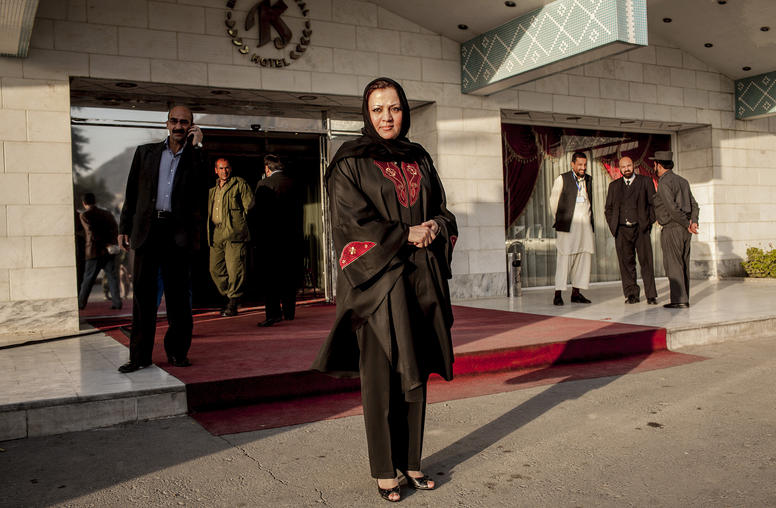
What Women Have Won
Five years ago, as the newly appointed and first woman president of the United States Institute of Peace, I was celebrating International Women’s Day in Kabul with the wonderful Afghan women on our USIP country team. Having first visited Afghanistan in 1997, when the country was in the grip of the Taliban, it was a joyous opportunity to mark nearly two decades of progress with this group of professional women—lawyers, scholars, and program managers.

Nancy Lindborg on the Iran Crisis and its Impact on Iraq and Afghanistan
USIP President and CEO Nancy Lindborg explains how U.S.-Iran tensions could exacerbate state fragility and hamper longstanding peacebuilding efforts in Iraq and Afghanistan, saying, “All of this can be put at risk with the current tensions as both countries really fear becoming collateral damage.”
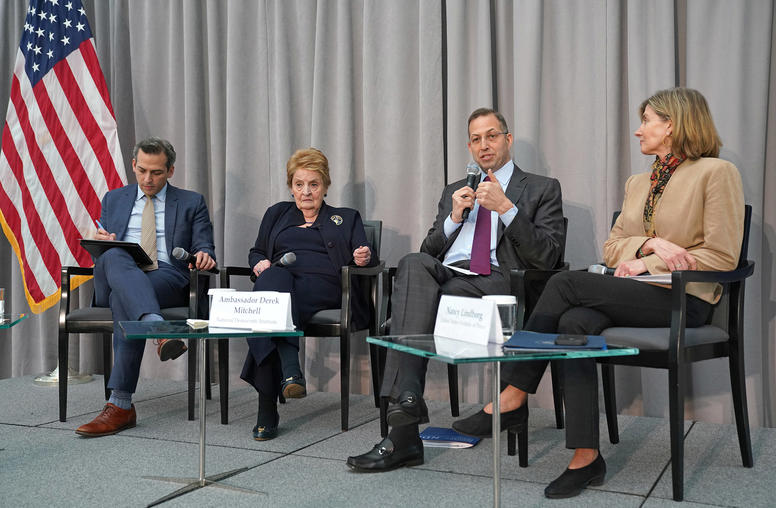
The Global Fragility Act: A New U.S. Approach
After several years of efforts by a bipartisan group of members of Congress and outside groups, Congress last month took legislative aim at a threat behind many of the world’s most pressing problems: fragile states. On December 20, as part of an appropriations package, President Donald Trump signed into law the Global Fragility Act, marking a new—if largely unnoticed— U.S. approach to conflict-prone states that can be vectors of violent extremism, uncontrolled migration, and extreme poverty.

Six Takeaways for the Next Decade of People Power
2019 is being called “the year of protest.” A nexus of corruption, inequality, and unaccountable and unresponsive governments has galvanized citizens across the globe. “People are saying ‘pay attention to us, you are there to serve us,’” observed Nancy Lindborg, USIP president and CEO. This year’s wave of people power shows that governments—whether they are democratic, semi-democratic, or authoritarian—are not immune to collective civic pressure.

Nancy Lindborg on the Role of People Power in Global Security
Returning from the Halifax International Security Forum, USIP President and CEO Nancy Lindborg explains why the growing number of “people power” movements around the world have left her optimistic, saying “the notion of what constitutes national security continues to evolve…security includes governments that are responsive to the needs of their people.”
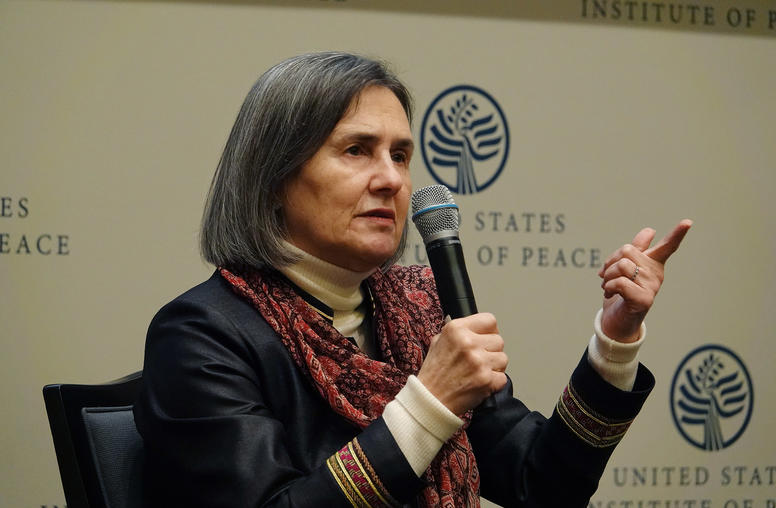
First Lady Rula Ghani on Afghan Women’s Consensus
As Afghans, the United States and the international community seek an end to the war in Afghanistan, the country’s first lady, Rula Ghani, says thousands of Afghan women nationwide have expressed a clear consensus on two points. They insist that the war needs to end, and that the peace to follow must continue to build opportunities for women. The single greatest step to advance Afghan women’s cause is education and training to build their professional capacities, Ghani told an audience at USIP.
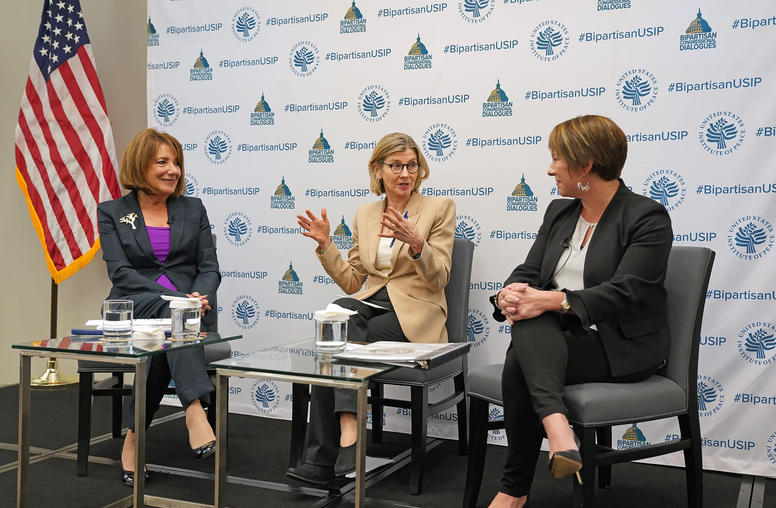
To Protect Afghan Women’s Rights, U.S. Must Remain Engaged
It’s been over a year since the U.S., led by Amb. Zalmay Khalilzad, opened talks with the Taliban aimed at ending the 18-year war. Over that year, Afghan women have demanded a seat at the negotiating table, worried that the hard-won gains made over the last two decades could be in jeopardy. Even with the peace process stalled, “it is vital that the U.S. remain engaged” to ensure that Afghan women’s rights are protected, said Rep. Martha Roby (R-AL) last week at the U.S. Institute of Peace’s latest Bipartisan Congressional Dialogue.
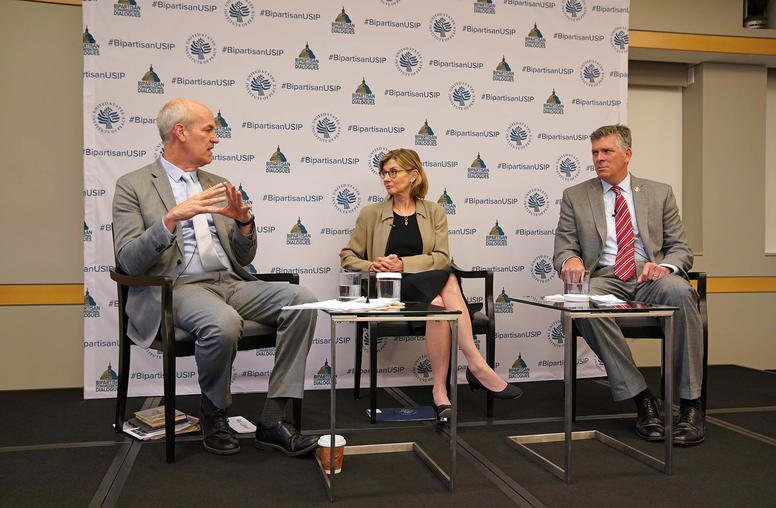
China Trade War: Risks and Strategies
The chances that trade talks scheduled to resume with China next month will result in any broad agreement with the U.S. are slim to none, said two members of a bipartisan congressional panel focused on U.S.-China relations. “It’s important that we keep talking,” said Rep. Rick Larsen (D-WA), the co-chair of the House of Representatives U.S.-China Working Group. “That’s a positive, but I haven’t seen anything that has changed to ensure that something would be different” when U.S. and Chinese trade officials are scheduled to sit down again in early October.

Nancy Lindborg on a New Prevention Policy 18 Years After 9/11
Eighteen years after 9/11, USIP President and CEO Nancy Lindborg reflects on the continued spread of violent extremism and points to the Task Force on Extremism in Fragile States as a blueprint for a new, preventive approach, saying, “I think we’ve all realized this is not a problem we can bomb our way out of.”